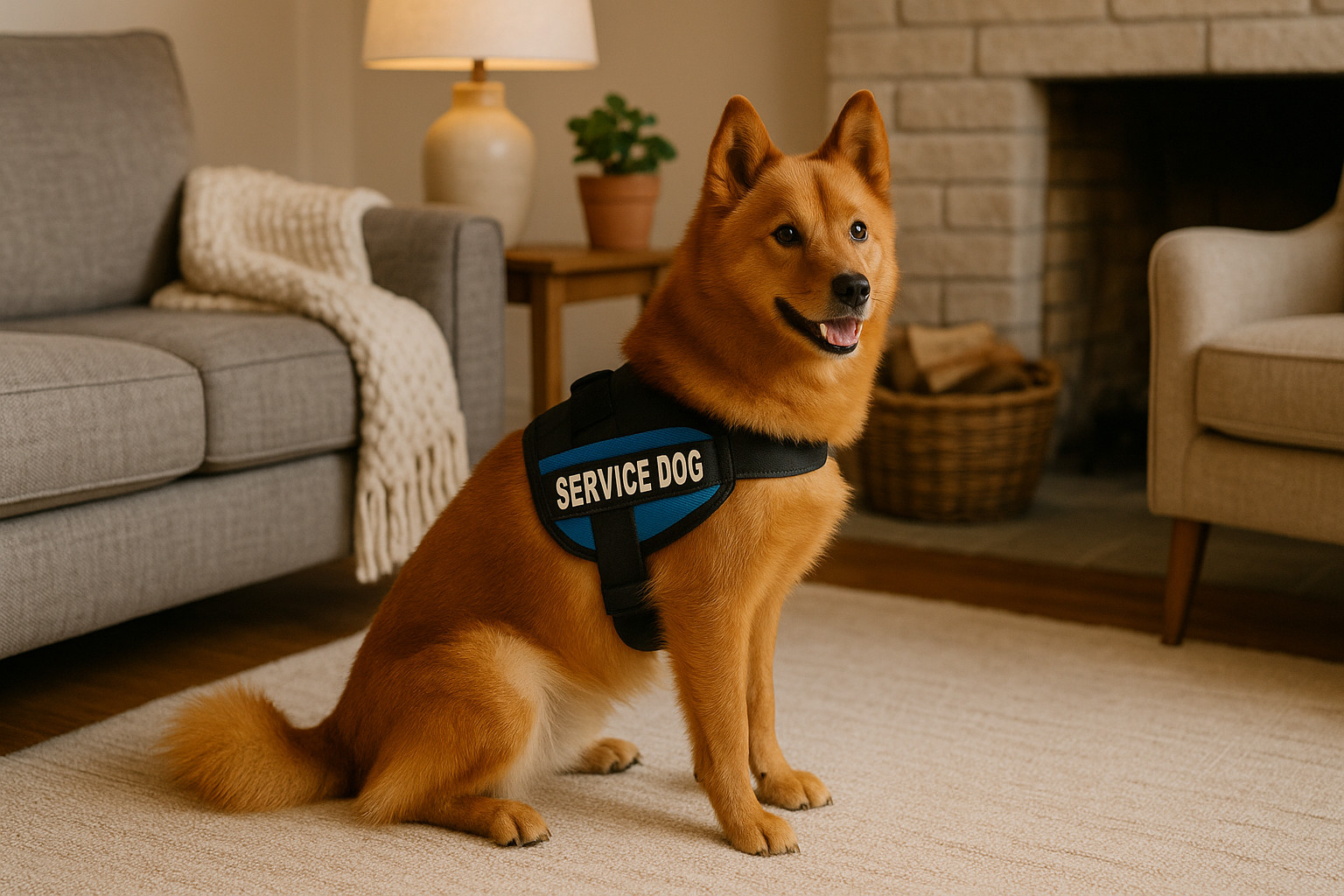Finnish Spitz as a Service Dog
Get Your Documents

The Finnish Spitz, known for its distinctive appearance and lively disposition, is gaining interest as a potential service dog. These dogs, traditionally bred in Finland for hunting small game and birds, boast unique traits that both complement and challenge service dog roles. This article explores the physical attributes, temperament, service work suitability, health considerations, and trainability of the Finnish Spitz, assessing their overall suitability as service animals.
Finnish Spitz Overview
The Finnish Spitz, often referred to as the “barking bird dog” for its hunting heritage, is celebrated for its vibrant red-golden coat, pointed ears, and lively tail. These dogs are medium-sized, agile, and generally healthy, making them appealing to those seeking a moderately sized service companion. They are Finland’s national dog and are cherished for both their companionable nature and distinctive vocalization skills.
Physical Characteristics
The Finnish Spitz is a medium-sized breed, with males typically standing between 17.5 to 20 inches at the shoulder and females slightly smaller. They weigh between 23 to 28 pounds, making them a manageable size for many handlers.
- Size & Build: Their size makes them versatile; they are large enough to perform some physical tasks but small enough to travel easily.
- Coat & Maintenance: Their dense double coat, which is weather-resistant, aids them in various climates but requires regular grooming to prevent matting and skin problems.
- Energy Levels: They possess high energy levels, necessitating adequate daily exercise, which may be a consideration for handlers who cannot provide regular physical activity.
The Finnish Spitz’s compact size and striking appearance are favorable for specific service roles, but their high energy levels and grooming needs could be drawbacks for some owners.
Temperament and Attitude
Characterized by their spirited and enthusiastic temperament, Finnish Spitz dogs are lively, alert, and independent. These traits stem from their strong hunting instinct and pedigree.
- Independence & Intelligence: These dogs are highly intelligent but sometimes exhibit a stubborn streak. Their independence can be a challenge in rigorous training environments, although it also signifies problem-solving capabilities.
- Sociability: Finnish Spitz dogs are generally sociable with humans and other animals. Their inherent gentleness and alertness can make them excellent alert dogs in service scenarios.
- Vocals: Renowned for their vocal nature, these dogs are quick to bark, which historically signaled hunters in forests. While this can be advantageous in alert roles, it may not be suitable for all service environments.
Their independent nature and vocal tendencies can be both an asset and liability, depending on the specific service tasks.
Types of Service Work
The Finnish Spitz’s characteristics make them particularly suitable for specific types of service work, though there are limitations due to their natural tendencies.
- Medical Alert: Their acute senses and awareness can make them excellent as medical alert dogs, especially for conditions like low blood sugar or seizures.
- Emotional Support: Their sociable and affectionate nature may place them well in therapeutic and emotional support roles, where companionship is vital.
- Detection: Owing to their historic role as hunters, they can be trained effectively for certain detection tasks, though this requires experienced trainers.
On the downside, their independence and vocalization can limit their use in roles requiring strict discipline, such as mobility support or settings where silence is imperative, like courtrooms or theaters.
Health Considerations
Generally healthy, the Finnish Spitz functions with few hereditary issues, though potential owners should be aware of some breed-specific health concerns.
- Longevity: They typically live between 12 to 15 years, allowing for long working life potential in service roles.
- Common Conditions: Hip dysplasia and patellar luxation are potential concerns, which could impair mobility tasks.
- Preventive Care: Regular veterinary check-ups and a balanced diet can minimize health risks. Regular grooming also prevents skin infections due to their double coat.
Ignoring these health factors may impact their effectiveness and longevity in specific service roles, requiring careful attention to preventive care.
Training and Suitability
Training a Finnish Spitz as a service dog often requires patience and expertise. Their intelligence is an asset, but their independent nature calls for trainers who command respect and understand positive reinforcement techniques.
- Suitability for Training: Finnish Spitz dogs respond best to training that incorporates play and rewards rather than repetition and force.
- Challenges: Their propensity to bark and independent streak can pose challenges, requiring early socialization and consistent training to minimize undesirable behaviors.
- Skills Acquisition: With capable training, they can perform various tasks like retrieving items, guiding handlers, or providing medical alerts.
Training often involves turning potential negatives, like vocalization, into positives by assigning these behaviors useful contexts, such as alerting to certain conditions.
Summary of Finnish Spitz
In summary, the Finnish Spitz can be a suitable service dog for specific roles, particularly where alertness, independence, and sociability are desired. However, they may not be ideal for all service roles, especially those requiring strict obedience or environments where barking may be disruptive.
- Strengths:
- Excellent medical alert capabilities due to keen senses.
- Suitable for emotional and social support attributes.
- Adaptable medium size makes them versatile for travel and some physical tasks.
- Weaknesses:
- Vocal tendencies can be inappropriate for certain environments.
- Independent nature requires experienced training.
- Ideal Service Roles:
- Medical alert roles for conditions like diabetes or epilepsy.
- Emotional support for handlers needing companionship.
- Detection tasks leveraging their strong hunting instincts.
The Finnish Spitz is a promising candidate for certain service roles, but potential handlers should carefully weigh their needs and the dog’s traits to ensure compatibility. Proper training and understanding of the breed will enhance their service capacity while mitigating challenges associated with their distinct characteristics.
Get Your Documents
Example State Cards













